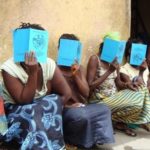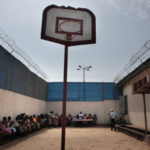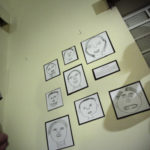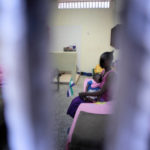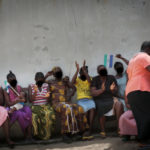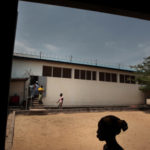Addressing the Needs of Women Behind Sierra Leone’s Prison Walls
Winner’s Citation:
The Namati staff who evaluated the entrants were enormously impressed with the high impact of this program working with women in prisons in Sierra Leone. AdvocAid’s work is highly scaleable, realistic, and delivers results. It employs a dynamic range of tools, including legal aid, legal education and a holistic approach to the needs of women in prison in a low-income setting like Sierra Leone. Its sustainability is inspiring, with many of its beneficiaries becoming paralegals upon release.
Background to AdvocAid’s work.
Download a case study that illustrates AdvocAid’s work.
AdvocAid was established in 2006 to address the needs of forgotten women behind prison walls – women negatively impacted by the criminal justice system in Sierra Leone. Women across the world make up a minority of the prison population and their needs are often overlooked. AdvocAid is one of the few holistic organisations solely dedicated to addressing the injustices and gender-specific needs of women and their children in conflict with the law in Africa.
In common with the social and economic dynamics of the country, women face marginalization within Sierra Leone’s legal system. Women’s imprisonment is closely related to poverty, both as the reason for their offences and because women most often cannot afford legal services, fines or bail. Antiquated laws mean that too often women are imprisoned over small debts, including those incurred by their husbands and other petty crimes. Police often target vulnerable women, such as sex workers, to exhort bribes or sex. Most women in detention have a background of physical and emotional abuse or mental health problems.
Many women in Sierra Leone don’t know or understand their legal rights; just 43.3 per cent of the adult population is literate and a pitiful 9.5 per cent of women (aged 25+) have some secondary school education. The result of this can be women admitting to crimes they did not commit and women not understanding their rights when arrested. Sierra Leone has a shortage of lawyers, with only around 400 lawyers for a population of six million, mostly centered in the capital. There is no government legal aid system as yet and most NGOs are not able to offer full legal representation throughout the court process. AdvocAid’s duty lawyers and paralegals work tirelessly to inform women of their rights and ensure they can access justice.
Prisons in Sierra Leone remain shocking places; women are forced into overcrowded cells, locked up for over 15 hours at a time in cramped and unsanitary conditions. It is not uncommon for women to be imprisoned with their new-born or very young children, and too often such women are refused the right to breastfeed, dramatically affecting the health and development of their baby and/or children. The prisons offer limited healthcare and rehabilitation services for women and there is no aftercare programme. AdvocAid steps into this gap to ensure that the rights of women and their children are respected and that they are supported to rebuild successful lives after detention.
- Women taking literacy classes sponsored by AdvocAid in Freetown prison. Photo by Alison Thompson © AdvocAid.
- Female prisoners in the yard in Freetown prison. Photo by Tom Bradley © AdvocAid.
- Self portraits drawn by detainees in art classes run by AdvocAid in Freetown prison. Photo by Tom Brdley © AdvocAid.
- A female prisoner and her baby in Freetown prison. Photo by Tom Bradley © AdvocAid.
- Female prisoners singing in Freetown prison. Photo by Tom Bradley © AdvocAid.
- In the prison yard at Freetown prison. Photo by Tom Bradley © AdvocAid.
How are you using grassroots legal advocates or legal awareness to address that problem?
AdvocAid provides holistic support to women caught up in Sierra Leone’s criminal justice system. As well as representing women in court, the organization provides legal advice, awareness on legal rights, education programmes to improve detainees’ prospects, welfare and rehabilitation support, as well as Sierra Leone’s only aftercare programme. AdvocAid supports vulnerable groups, such as sex workers, to be empowered about their rights and help to hold the police accountable by filing complaints in cases of abuse of police power. It works in eight towns across Sierra Leone and is usually the only comprehensive legal aid service available. The organization has trained a network of young women from their communities to provide legal advice, support and ensure rights are upheld. It often uses former detainees as paralegals, supporting their empowerment.
As well as providing these short term interventions, AdvocAid works on advocacy and law reform campaigns focused on wider issues impacting women in the justice system, in order to change women’s future prospects in the long term.
It delivers extensive educational work, focusing on women’s rights; through this, it aims to empower women to have a voice and stand up for what they know to be right. Due to the low literacy levels across the country, AdvocAid delivers educational programmes in innovative and creative ways, including via Police Case, a TV drama that has been broadcast across the Sierra Leone Broadcasting Corporation (SLBC) and screened country-wide via a human rights film festival. AdvocAid is in the process of writing and producing a second series that will be launched in 2015.
Police Case focuses on the story of three vulnerable women who are in conflict with the law and end up in detention. The drama is based on real-life stories of women whom AdvocAid has assisted, and the series follows their progress from the police station through to the Magistrates Court and highlights issues such as rights upon arrest, bail, detention time limits, domestic violence and rights of an accused at court.
The most recent screening of the drama, in December 2014, was followed by a live call-in discussion programme. AdvocAid targeted key cities outside of the capital to try and ensure vulnerable women and girls were being reached, and educated particularly about their rights during the State of Emergency, minimising the likelihood of being detained for breaching the newly enacted Ebola legislation. As well as broadcasting through the SLBC, it aired the drama online.
The drama is accompanied by a Facilitator’s Guide to aid the teaching potential of the programme. The guide and full series of Police Case have been distributed to key stakeholders and women’s rights organisations across the country.
What difference does AdvocAid make?
AdvocAid has provided legal aid to over 2,300 girls and women, and freed many from wrongful detention. Thousands more women and girls have been reached via its awareness-raising programmes. Of note, AdvoAid’s legal aid work has resulted in three women having their death sentences overturned and a fourth released on bail pending appeal (a first in Sierra Leone’s legal history).
Longer-term advocacy and campaigning work has resulted in the following positive outcomes:
- The government’s commitment to abolish the death penalty
- The creation of two separate detention centres for women
- Exposing the practice of detaining women for debt
- A new Legal Aid Act
- The first training and simplified handbook on UN Rules on the Treatment of Female Prisoners in Africa
- Greater priority and visibility of the issue of women in the criminal justice system – ensuring women are not forgotten behind prison walls
The feedback from the Police Case TV series has been very positive. At the end of each airing, a number is provided for viewers to provide feedback, and AdvocAid has received calls and SMS texts from all over the country – confirming its reach to the more rural locations.
The series gained significant domestic and international media attention, with feedback coming from as far away as Norway and The Gambia. The series was nominated for an Innovating Justice Award by The Hague Institute for the Internationalisation of Law. Thousands of people have benefited from innovative legal rights information by watching Police Case; the first episode online alone has received over 18,000 views.
Police Case has enabled AdvocAid to:
- Increase awareness of legal rights and responsibilities
- Enhance justice reform discussion, with a particular focus on gender justice
- Create positive female role models by featuring strong female characters – such as a female paralegal
- Strengthen the capacity of popular media in Sierra Leone to produce positive, high-quality programming in relation to human rights issues
What advice would you give to others running such a program?
AdvocAid says: “Since our founding nearly ten years ago, we have learnt a great deal. Namely, that it is vital to offer holistic services if you want to create long-term change. You need to be able to respond appropriately to a beneficiary’s needs; offering legal advice alone will not be enough to enable them to change their life.
Through providing education, welfare support and the confidence to build a stronger future, we’re offering women so much more than legal support. For some, we’re offering a new career pathway by inviting them into the AdvocAid family as paralegals.
Alongside this, we’ve learnt how important it is to know your focus; don’t try and solve every issue or work with every group. Know what you do well, and be outstanding at it. By building robust and meaningful partnerships, you will be able to increase your reach without compromising your core aims or original charitable objectives. Building partnerships and allies to achieve impact is also extremely important; particularly with civil society organisations, the media and government institutions.
Be careful to not compromise your programmes, or amend your target beneficiary groups to reach donor money. Be known as experts in what you do and you’ll find funding that is aligned to your core programmes.
We have learnt the importance of capturing personal stories and relaying them to a variety of audiences in a way that they can relate to. By telling the stories of the women we work with, stories that are so often unjust and full of heartache, has enabled us to reach a far wider audience and achieve greater impact. This was certainly the case when we were campaigning against the death penalty. We turned the issue into one that people could relate to, sharing the stories of women on death row. Using photographs, video and social media has been key to making people understand why they should care and take injustice personally.”


